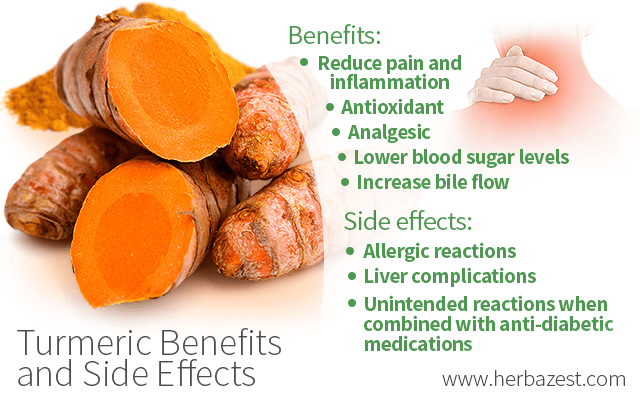When it comes to treating many chronic diseases, the effects of turmeric can be quite beneficial, mainly thanks to curcumin, a phenolic compound that occurs naturally in turmeric and is thought to be responsible for much of its anti-inflammatory, antioxidant, and analgesic properties.
Though turmeric is full of therapeutic and medicinal potential, there may exist certain drawbacks to consuming it.
Turmeric's Effects on Pain and Inflammation
Benefit. Among the most important effects of turmeric are its ability to reduce pain and inflammation. Turmeric is also known to lower histamine, a compound found in all body tissues that promotes swelling and provokes an immune response in people with allergies.1 Under certain circumstances, histamine levels spike, inducing a chain of chemical reactions that cause inflammation, the usual culprit of allergic reactions.
Downside. It is not uncommon for medical professionals to prescribe non-steroidal anti-inflammatory drugs (NSAIDs) to help manage pain from various ailments. Care should be taken when using these medications in conjunction with turmeric treatments, as curcumin interactions may increase the risk of unintended side effects.
Turmeric's Effects on Skin
Benefit. Antioxidants found in turmeric are comparable to the healing properties of vitamin C and vitamin E, both protective agents that prevent skin cells from free radical damage, premature aging, and oxidative stress.2,3 Though its exact mechanism of action is still being studied, curcumin's ability to increase the oxygenation of blood cells is cited as one of the main turmeric benefits.
Downside. Although the antioxidant action in turmeric is certainly useful for its cell-regenerating, age-defying, and wound-healing benefits, curcumin may behave as a skin allergen for certain individuals, resulting in itching, redness, rashes, dryness, and other undesirable effects.
Turmeric's Effects on Arthritis
Benefit. Anti-inflammatory and analgesic effects form the core of turmeric's various health benefits for healing symptoms of many illnesses, including arthritis. Joint swelling, tenderness, and overall pain intensity from arthritis can be effectively reduced or eliminated after treatment with turmeric.4
Downside. Though its benefits for arthritis management are worthwhile, turmeric may cause adverse effects when combined with certain other medications also used to treat arthritis symptoms.
Turmeric's Effects on Liver Health
Benefit. The protective action of curcumin possesses powerful implications for the overall health of the liver. It has been shown to both increase bile flow in the liver and bile excretion from the bladder. Moreover, curcumin helps to reduce hepatitis C gene expression and blocks replication of the virus.5
Downside. While no evidence of liver complications in humans has been reported as side effects of turmeric, some liver complications have been noted in animals treated with turmeric, and its use can worsen the symptoms of people suffering from gallbladder diseases.
Turmeric's Effects on Diabetes
Benefit. Curcuminoids and sesquiterpenoids in turmeric come together to lower blood sugar levels, which is useful for reversing the effects of diabetes. In addition, curcumin helps to improve the overall function of beta cells so that the body can produce more insulin.6
Downside. Because of its hypoglycemic effect, turmeric may cause unintended reactions - such as fatigue, dizziness, blurred vision, and anxiety - when combined with anti-diabetic medications.
When consumed in recommended doses, turmeric can be a safe and effective healing herb for many illnesses. However, turmeric benefits and side effects are still being researched, and individual reactions are determined by a wide range of personal factors. For that reason, it is highly recommended to consult a physician or trusted medical professional before starting to take any turmeric supplements.
Sources
- Age: The Official Journal of the American Aging Association, Antioxidant Curcuma extracts decrease the blood lipid peroxide levels of human subjects, 1995
- Comprehensive Reviews in Food Science and Food Safety, Curcumin and Liver Disease: from Chemistry to Medicine, 2013
- Federation of European Biochemical Societies, Curcumin inhibits hepatitis C virus replication via suppressing the Akt-SREBP-1 pathway, 2009
- Free Radical Biology & Medicine, Curcumin, an antioxidant and anti-inflammatory agent, induces heme oxygenase-1 and protects endothelial cells against oxidative stress, 2000
- Journal of Clinical and Aesthetic Dermatology, Curcumin, A contact Allergen, 2015
- Journal of Clinical Pharmacy and Therapeutics, Herbal medication: potential for adverse interactions with analgesic drugs, 2002
- Planta Medica, Pharmacology of Curcuma longa, 1991
- Herbal Medicine, Biomolecular and Clinical Aspects, Chapter 13, Turmeric, the golden spice, 2011
- Journal of Food Science, Choleretic activity of turmeric and its active ingredients, 2016
- Journal of Alternative and Complementary Medicine, Safety and anti-inflammatory activity of curcumin: a component of turmeric (Curcuma longa), 2003
Footnotes:
- Molecular Nutrition Food Research. (2008). Immunomodulatory effects of curcumin in allergy. Retrieved October 5, 2021, from: https://onlinelibrary.wiley.com/doi/abs/10.1002/mnfr.200700293
- Nutrients. (2019). Potential of Curcumin in Skin Disorders. Retrieved October 5, 2021, from: https://www.ncbi.nlm.nih.gov/pmc/articles/PMC6770633/
- Life Sciences. (2014). Curcumin as a wound healing agent. Retrieved October 5, 2021, from: https://pubmed.ncbi.nlm.nih.gov/25200875/
- Phytotherapy Research. (2012). A randomized, pilot study to assess the efficacy and safety of curcumin in patients with active rheumatoid arthritis. Retrieved September 23, 2021, from: https://pubmed.ncbi.nlm.nih.gov/22407780/
- Nutrients. (2018). Curcumin in Liver Diseases: A Systematic Review of the Cellular Mechanisms of Oxidative Stress and Clinical Perspective. Retrieved October 5, 2021, from: https://www.ncbi.nlm.nih.gov/pmc/articles/PMC6073929/
- Diabetes Care. (2012). Curcumin extract for prevention of type 2 diabetes. Retrieved September 23, 2021, from: https://www.ncbi.nlm.nih.gov/pmc/articles/PMC3476912/




